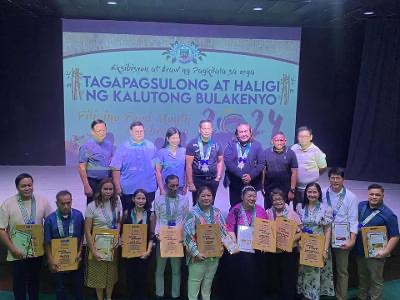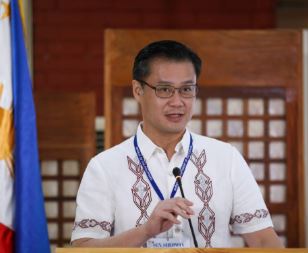
The Department of Tourism (DOT) is pushing for the inclusion of towns and cities practicing Kalutong Bulakenyo in the City of Gastronomy of the United Nations Educational, Scientific and Cultural Organization (UNESCO).
DOT Regional Director Richard Daenos said all requirements needed to be part of the list
already exist and are being sustained.
Heirloom dishes
First, Kalutong Bulakenyo is a well-developed gastronomy with origins from the precolonial, Spanish colonial, American colonial and post-independence periods.
The heirloom dishes were passed on from one generation to another. These include the Menudong Bukid or Menudong Barrio, Longganisang Calumpit and Tinapang Bangus.
Second, restaurants in Bulacan that offer Kalutong Bulakenyo dishes are increasing and gaining attraction from local and foreign tourists.
For instance, Bistro Malolenyo located in the Kamistisuhan District of Malolos pioneered authentic Bulacan heritage cuisines such as Nilitsong Manok sa Saha ni Andres Bonifacio, Tinolang Manok ni Jose Rizal, Pochero ni Marcelo H. Del Pilar, and Arroz Ala Cubana ni Pangulong Emilio Aguinaldo.
Third, local governments ensure that heritage restaurants used indigenous ingredients used in traditional cooking.
“Fourth, local chefs and cooks continue to improve their traditional cooking practices amid
technological advancement,” Daenos furthered.
Important tourism product
Fifth, Kalutong Bulakenyo has become an important tourism product with numerous vibrant festivals being held annually. These include the Minasa Festival of Bustos, Kakanin Festival of Marilao, Chicharon Festival of Santa Maria, Pastilyas Festival of San Miguel, and Fiesta Republika of Malolos.
The Provincial History, Arts & Culture, and Tourism Office (PHACTO) also launched in 2022 a recognition to those working to preserve heirloom dishes through the “Pagkilala sa mga Tagapagsulong at Haligi ng Kalutong Bulakenyo”.
And sixth, the teaching of Kalutong Bulakenyo dishes has been integrated in educational institutions.
The provincial government started in 2012 teaching the cooking of heirloom dishes in Home Economic subjects in schools and food preparation and restaurant management-related courses in colleges and universities.
To make this initiative into reality, SHINE Bulacan or Sustainable Heritage Imbibing Nationalism through EduTourism was formed in 2021 in Bulacan State University through the help of PHACTO.
It is being funded by the 40 percent share of the Commission on Higher Education from the travel tax collected by the Tourism Infrastructure and Enterprise Zone Authority.
Distinct identity of Bulakenyos
Governor Daniel Fernando said Kalutong Bulakenyo is often associated with the province’s historical sites in a way that satisfies the tourists’ cravings for authentic cuisine.
Indeed, the UNESCO City of Gastronomy bid will further create the distinct identity of Bulakenyos and serve as a reflection of its local culture.
The Department of Tourism (DOT) is pushing for the inclusion of towns and cities practicing Kalutong Bulakenyo in the City of Gastronomy of the United Nations Educational, Scientific and Cultural Organization (UNESCO).
DOT Regional Director Richard Daenos said all requirements needed to be part of the list
already exist and are being sustained.
Heirloom dishes
First, Kalutong Bulakenyo is a well-developed gastronomy with origins from the precolonial, Spanish colonial, American colonial and post-independence periods.
The heirloom dishes were passed on from one generation to another. These include the Menudong Bukid or Menudong Barrio, Longganisang Calumpit and Tinapang Bangus.
Second, restaurants in Bulacan that offer Kalutong Bulakenyo dishes are increasing and gaining attraction from local and foreign tourists.
For instance, Bistro Malolenyo located in the Kamistisuhan District of Malolos pioneered authentic Bulacan heritage cuisines such as Nilitsong Manok sa Saha ni Andres Bonifacio, Tinolang Manok ni Jose Rizal, Pochero ni Marcelo H. Del Pilar, and Arroz Ala Cubana ni Pangulong Emilio Aguinaldo.
Third, local governments ensure that heritage restaurants used indigenous ingredients used in traditional cooking.
“Fourth, local chefs and cooks continue to improve their traditional cooking practices amid
technological advancement,” Daenos furthered.
Important tourism product
Fifth, Kalutong Bulakenyo has become an important tourism product with numerous vibrant festivals being held annually. These include the Minasa Festival of Bustos, Kakanin Festival of Marilao, Chicharon Festival of Santa Maria, Pastilyas Festival of San Miguel, and Fiesta Republika of Malolos.
The Provincial History, Arts & Culture, and Tourism Office (PHACTO) also launched in 2022 a recognition to those working to preserve heirloom dishes through the “Pagkilala sa mga Tagapagsulong at Haligi ng Kalutong Bulakenyo”.
And sixth, the teaching of Kalutong Bulakenyo dishes has been integrated in educational institutions.
The provincial government started in 2012 teaching the cooking of heirloom dishes in Home Economic subjects in schools and food preparation and restaurant management-related courses in colleges and universities.
To make this initiative into reality, SHINE Bulacan or Sustainable Heritage Imbibing Nationalism through EduTourism was formed in 2021 in Bulacan State University through the help of PHACTO.
It is being funded by the 40 percent share of the Commission on Higher Education from the travel tax collected by the Tourism Infrastructure and Enterprise Zone Authority.
Distinct identity of Bulakenyos
Governor Daniel Fernando said Kalutong Bulakenyo is often associated with the province’s historical sites in a way that satisfies the tourists’ cravings for authentic cuisine.
Indeed, the UNESCO City of Gastronomy bid will further create the distinct identity of Bulakenyos and serve as a reflection of its local culture.





